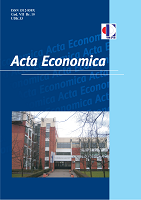Анализа односа између компензационих пракси и пословних резултата
Analysis of the relationship between compensation practices and business performance
Author(s): Gordana Ilić, Branka Poljašević, Saša VučenovićSubject(s): Business Economy / Management, Financial Markets, Accounting - Business Administration, Human Resources in Economy, Socio-Economic Research
Published by: Економски факултет Универзитета у Бањој Луци
Keywords: compensation management; remuneration strategies; remuneration costs; profit per employee; business performance;
Summary/Abstract: Compensations are total rewards (tangible and intangible) that employees receiving for their work. Since the amount and structure of total compensation directly influences motivation, attitudes and behaviours of employees, employers tend to put compensations in the function of achievement of business objectives. A review of relevant literature in this field, we conclude that the successful companies worldwide are long time ago rejected the traditional system of remuneration which has been based solely on a fixed basic pay, while this system is in the domestic business organizations still dominant. Instead, successful companies have embraced a new system of remuneration that emphasizes the significance of intangible components of a compensation package, because without a significant increase in remuneration costs may increase the attractiveness of jobs, attract, motivate and retain employees. In addition to consideration of the role and importance of compensation management in organizations, and analysis of contemporary practices and compensatory instruments available to employers, through this work and practical research, we evaluated the adequacy of the remuneration system in large and medium-sized enterprises operating in the Republic of Srpska. The results show that there is no strong link between material reward, expressed as a basic pay, and business performance, which indicates the inadequacy of the existing system of remuneration. Furthermore, the results suggest that material reward does not represent a sufficient motivation to employees to increase their work performance and thereby contribute to improving of the business performance of domestic companies.
Journal: Acta Economica
- Issue Year: 10/2012
- Issue No: 17
- Page Range: 31-50
- Page Count: 20
- Language: Serbian

